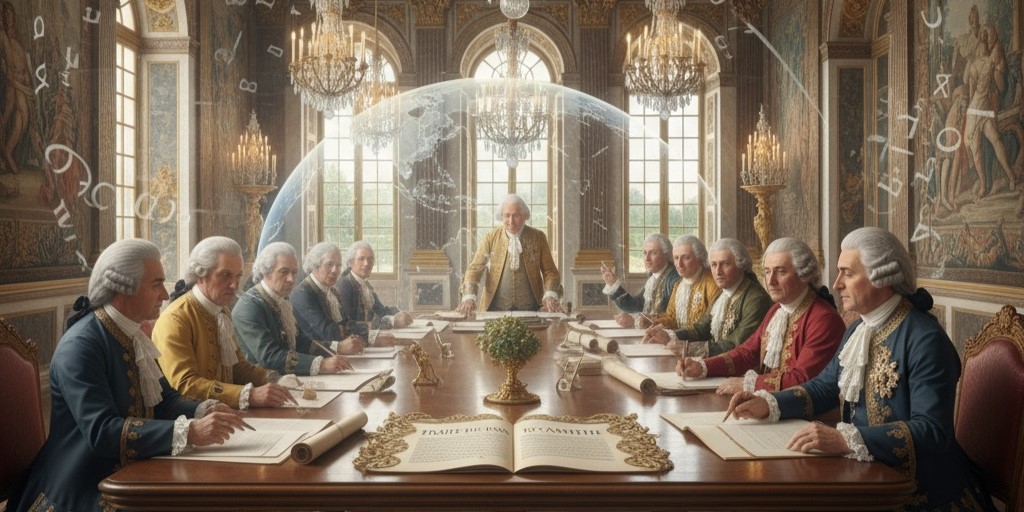
Did you know French was once the universal language of international relations?
French once stood as the universal language of diplomacy, guiding treaties, etiquette, and global relations for centuries. Its influence, rooted in France’s power and cultural prestige, still echoes today through the words and phrases diplomats use. At Interpro, we build on that legacy—recognizing that language carries history, nuance, and impact. Our work ensures every translation reflects not just meaning, but the cultural depth behind it.
From Versailles to Global Video Calls: The Enduring Power of Language
At Interpro, we believe that words do more than convey ideas. They shape influence, strategy, and relationships. That has been true for centuries. I work with clients across legal, governmental, and educational sectors. I see every day how language choices affect diplomacy, negotiation, and outcomes.
Long before real-time multilingual interpretation and XML translation became part of our workflow, the world relied on a different diplomatic language: French.
Why This Matters for Our Clients
But what does this topic have to do with managing translation services for documents or coordinating website localization today? Because we know what’s behind the words.
At Interpro, we believe that to localize content effectively (whether it’s for eLearning localization, PPTX translation, or XML translation), you have to understand the cultures, histories, and power structures that shape language.
That’s why our team isn’t just made up of project managers and linguists. We’re researchers, readers, and language lovers. We dig deep into context, connotation, and cultural relevance so our clients can communicate with clarity and confidence.
Here’s what we know:
- Language is never neutral and is always changing.
- Cultural nuance drives results.
- Successful communication builds trust and clarity.
This mindset is essential whether we are supporting international education platforms or handling multilingual contracts. We understand what is behind the words.
The Golden Age of French in Global Diplomacy
French was not chosen for diplomacy randomly. It became the preferred language of treaties, etiquette, and negotiation for several key reasons:
- Cultural Prestige: France was seen as the cultural center of Europe during the 17th and 18th centuries, with its art, literature, and philosophy influencing the continent. The elegance of the French language added to its appeal in diplomatic circles.
- Political Power: The establishment of France as a leading European power, particularly under Louis XIV, meant that French diplomacy set the tone for international relations. France’s involvement in significant treaties and its role in major conflicts solidified its influence.
- Elite Education: The French language was the language of the educated elite and aristocracy across Europe. Many diplomats and officials were trained in French, leading to its adoption in diplomatic contexts.
- Formalization of Treaties and Agreements: Significant treaties, such as the Peace of Westphalia (1648) and the Congress of Vienna (1815), were conducted in French, further entrenching its status as the diplomatic lingua franca.
Patrick loves talking about history in general, which makes for interesting office conversations when the team starts talking about the history of languages.
The Shift to English and the Role of Geopolitics
French became the primary language of diplomacy in the 17th century during the reign of Louis XIV also known as “The Sun King”. By the time of the Peace of Westphalia in 1648, France had established itself as a dominant European power. That rise in power brought with it linguistic influence.
This status of the French continued throughout the 18th and 19th centuries, reaching its zenith during the Congress of Vienna in 1815. However, the reign of French as the dominant diplomatic language began to decline after World War I, particularly in the early 20th century, as English started to gain prominence, especially with the rise of the United States as a global power.
Historical events played a significant role in the rise and fall of French diplomacy in many ways:
- The Thirty Years’ War and the Peace of Westphalia (1648): This conflict established France as a dominant power in Europe and solidified the use of French in diplomatic negotiations, marking the beginning of its prominence as the language of diplomacy.
- The Enlightenment: The intellectual movement of the 18th century emphasized reason and dialogue, further enhancing French cultural prestige and solidifying its status in international relations.
- The Napoleonic Era: Napoleon’s conquests spread French influence across Europe, reinforcing the use of the language in diplomatic circles. The Congress of Vienna (1815) also underscored French as the lingua franca, as European powers negotiated peace and order.
- World War I and the Rise of English: The aftermath of the war marked a decline in French influence, as the United States emerged as a global power. English began to take precedence in international diplomacy, leading to a shift away from French.
These events illustrate how geopolitical shifts and cultural movements influenced the status of French in the realm of diplomacy.
The Changing Role of Diplomats
During the period when French was the language of diplomacy, the role of diplomats evolved significantly in several ways:
- Increased Formalization: Diplomacy became more structured, with formal protocols and conventions established for diplomatic conduct. Diplomats were expected to adhere to these rules, which enhanced the professionalism of diplomatic missions.
- Expansion of Diplomatic Missions: The number of diplomats and embassies increased as countries recognized the importance of maintaining diplomatic relations. This expansion allowed for more continuous dialogue and negotiation, reducing the chances of conflict.
- Role of Cultural Diplomacy: Diplomats began to play a crucial role in cultural exchange, promoting their nation’s culture and language as a means of soft power. This was especially true during the Enlightenment, where ideas and philosophies spread through diplomatic channels.
- Shift in Power Dynamics: As nations like France, Britain, and emerging powers like the United States became more influential, the role of diplomats shifted to include not just negotiation but also the management of international relations and alliances.
These factors together created an environment where French was not only preferred but expected in the realm of diplomacy.
Patrick Pittsford, Senior Account Executive, focused on a translation project at Interpro Headquarters
The Lingering Influence of French in Global Diplomacy
The cultural influence of France manifested in other nations through several avenues:
- Language and Education: French became the language of choice for the educated elite in various European countries. Schools and universities adopted French as a primary language of instruction, and many aristocrats sent their children to study in France.
- Literature and Philosophy: French literature, philosophy, and Enlightenment ideas significantly impacted other nations’ intellectual movements. Works by authors like Voltaire, Rousseau, and Montesquieu were widely read and influenced political thought and cultural discourse in countries like England, Germany, and Russia.
- Fashion and Art: French fashion set trends across Europe, with many countries adopting French styles in clothing, art, and architecture. The French artistic movement influenced painters and architects, leading to the proliferation of neoclassical styles.
- Diplomatic Practices: The protocols and etiquette established by French diplomacy were emulated by other nations. The formalization of diplomatic language and practices influenced how treaties were negotiated and signed across Europe.
Finally, various French terms are still commonly used in our diplomacy today:
- Diplomate: This term refers to a diplomat or an official representing a country in foreign affairs, retaining its French origin in many languages.
- Coup d’état: Meaning “strike of state,” this term is used to describe a sudden overthrow of a government, often in a political context.
- Entente: Translated as “understanding,” this term is often used to describe a friendly agreement or alliance between countries.
- Protocole: Referring to a system of rules and formalities in diplomatic interactions, this term remains relevant in diplomatic practices.
These terms reflect the enduring influence of French on diplomatic language and practices worldwide.
- À la carte: Used to describe a situation where options are available individually rather than as a set, often in negotiations.
- Détente: Referring to the easing of strained relations, particularly in the context of international tensions.
- Fait accompli: Meaning “accomplished fact,” this phrase is used to describe a situation that has already been decided and is irreversible, often in negotiations or diplomatic discussions.
- Savoir-faire: This term denotes the ability to act appropriately in social situations, particularly in diplomacy, where cultural sensitivity is essential.
These phrases show the continued usage of French terminology in diplomatic contexts, reflecting its historical influence on international relations, not only when French was the main language but also in today’s diplomacy.
See More Behind-the-Scenes Stories from Interpro
Discover more cultural perspectives like Patrick’s as we look back over Interpro’s history supporting translation goals around the world.
Need expert support growing your multilingual communications? Let’s get started.
Explore Services
Consulting • Translation • eLearning • Video & Multimedia • Document
Category: Culture
Tags: global communication, translation history
Service: Translation Services
Don't forget to share this post!
Stay Updated with Interpro
Subscribe to our newsletter for the latest updates and insights in translation and localization.







